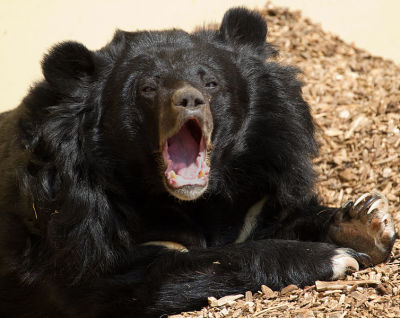Saying animals have culture diminishes humans

A recent article in the national magazine of the Sierra Club asked the question, “Does a Bear Think in the Woods?” Beyond the clever play on the old rhetorical question, the article made the remarkable claim that the intelligence of bears, chimpanzees, and other great apes shares “many properties with our own.”
What prompted the article was a study of black bears in the northeast. A researcher, who has spent twenty-two years observing these animals in New Hampshire, told the author that bears are “like us. They judge. They punish. They have gratitude and friendship.”
The article also cited the example of a black bear in Upstate New York who figured out how to open the “latest in bear-proof canisters.” Soon afterwards, “other local bears soon followed suit,” which prompted the question; “Did she teach them?”
Of course, no one who has owned a dog would find any of this all that surprising. That animals have what might be called feelings is undeniable, and animals are often smarter than we expect them to be. One of my friends successfully trained his Portuguese water dog to open a refrigerator and bring him a beverage. And many nature documentaries teach us that most animals spend the first part of their lives learning by emulating their mothers.
All of this can be amazing to watch, but it still leaves us a long way from saying that animals think like humans in any meaningful way. It certainly doesn’t warrant calling the woods a “neighborhood” instead of a “habitat.”
One of the things that’s behind the tendency to anthropomorphize bears, dogs, and other animals is the belief that animals and people are locked in a kind of “zero sum” game, as if the only way to assure the continued survival of animals is to deny and/or diminish how distinctly different they are from humans. In the process, man’s unique role as God’s image bearer and steward in the created order is also denied.
These denials are especially obvious in all the talk about animal “culture.” In humans, “culture” includes the “customs, arts, social institutions, and achievements of a particular nation, people, or other social group.”
No animal, no matter how smart or clever, has produced anything that remotely resembles these things. Whenever the word “culture” is used to describe animal behavior, it is always defined down to mean “socially transmitted behaviors,” such as a group of chimpanzees using a stick to dig up termites or Japanese macaques washing sweet potatoes before eating them.
Calling this “culture” only makes sense if human uniqueness has been ruled out beforehand.
All of this wishful thinking rejects the unique status humans have in the created order as created in God’s image and as co-creators with Him. It’s a status that no bear shares, no matter how many bear-proof containers she can break into.
Resources
Does a Bear Think in the Woods? Brandon Keim | Sierraclub.org | February 26, 2019
The temple of Fido Warren Cole Smith | wng.org | March 30, 2019
Originally posted at Breakpoint.




















